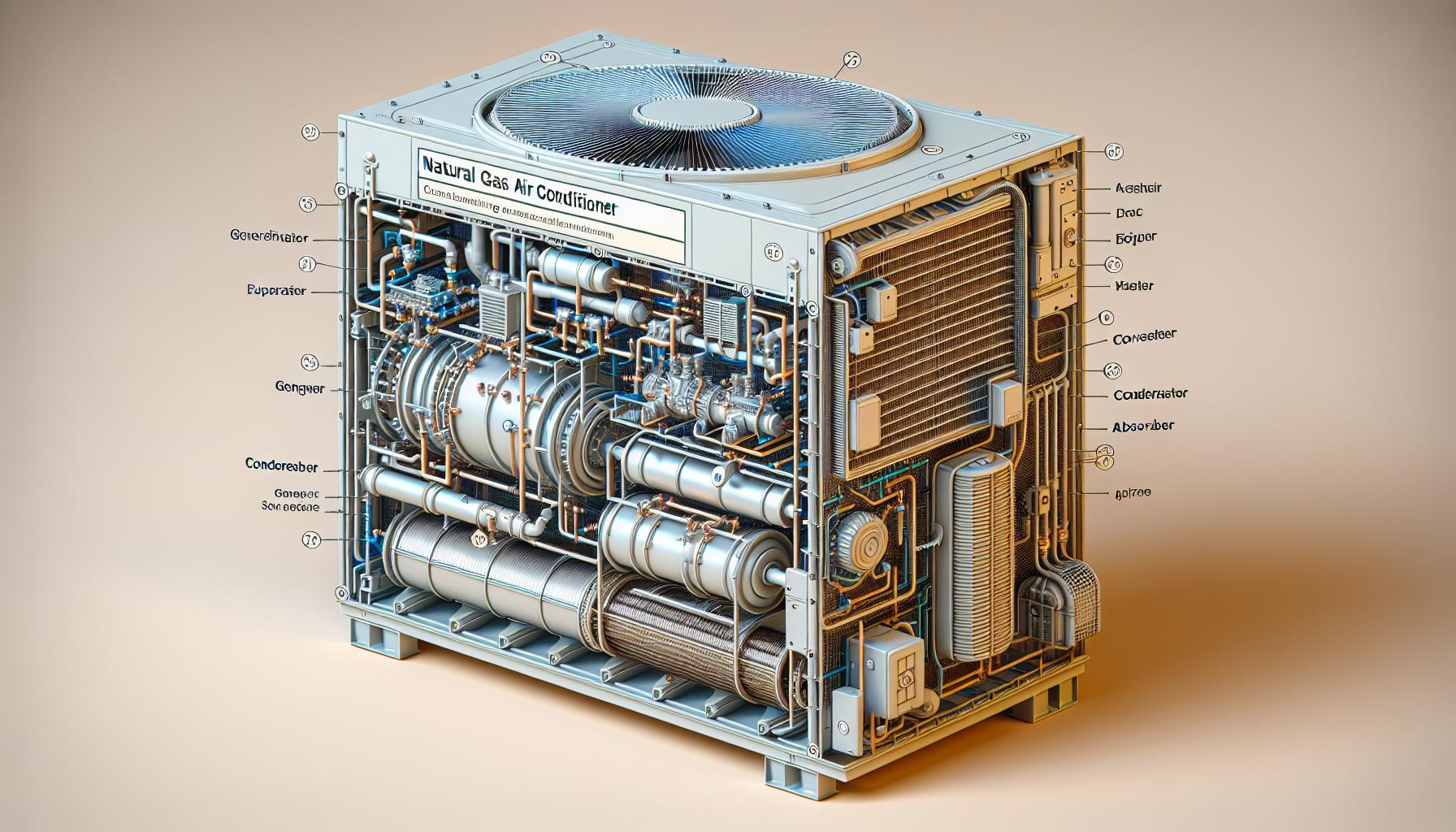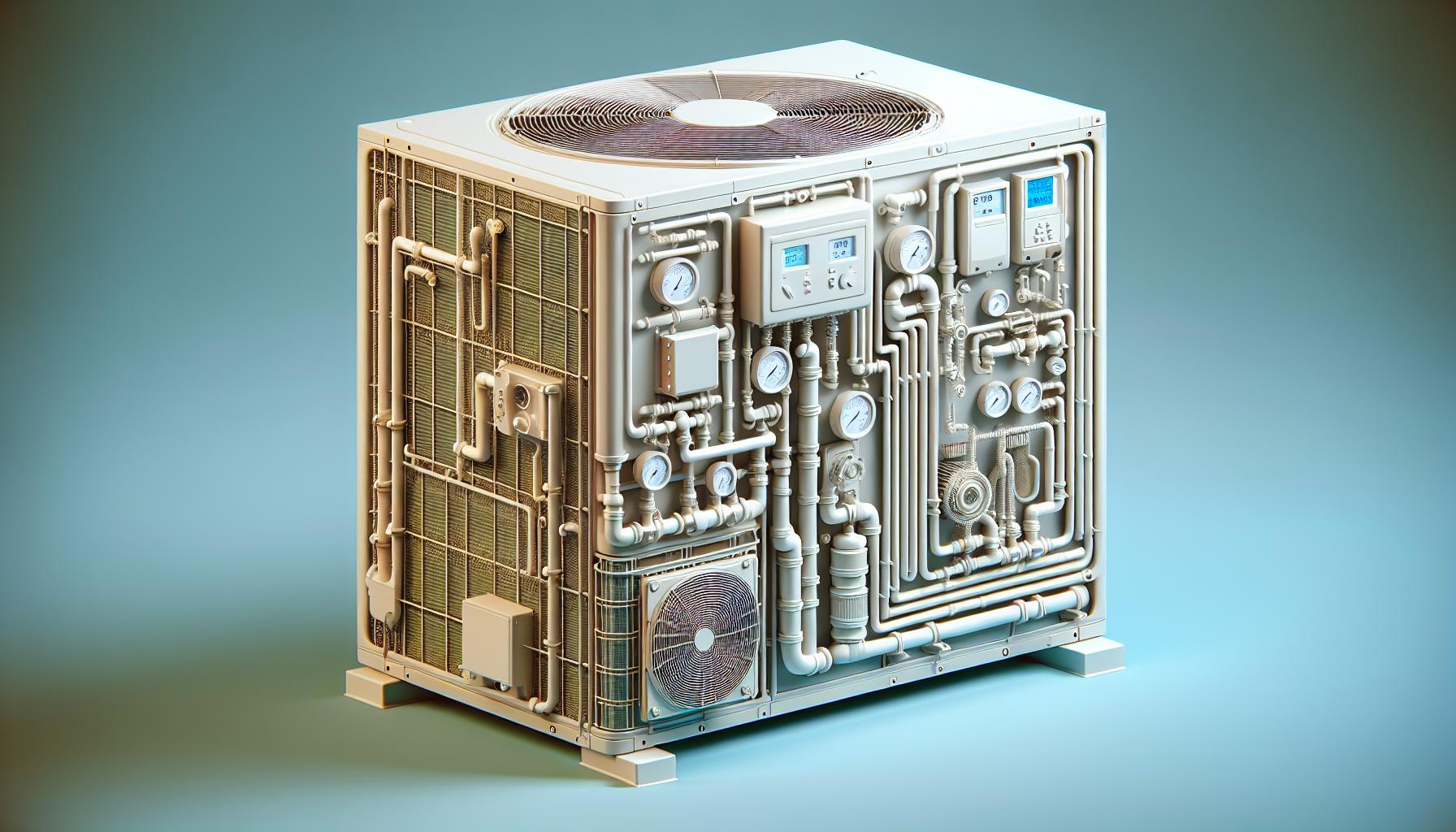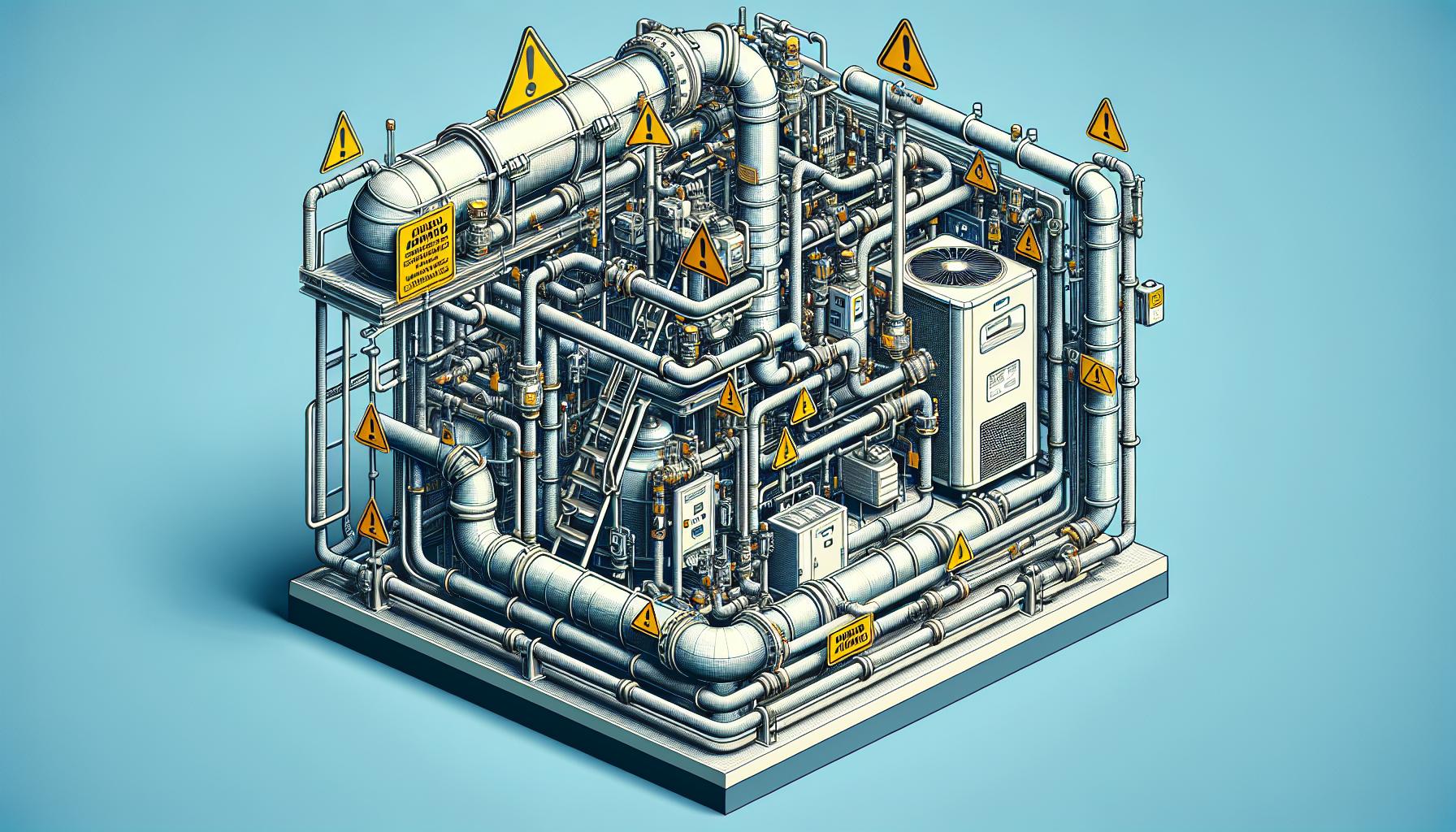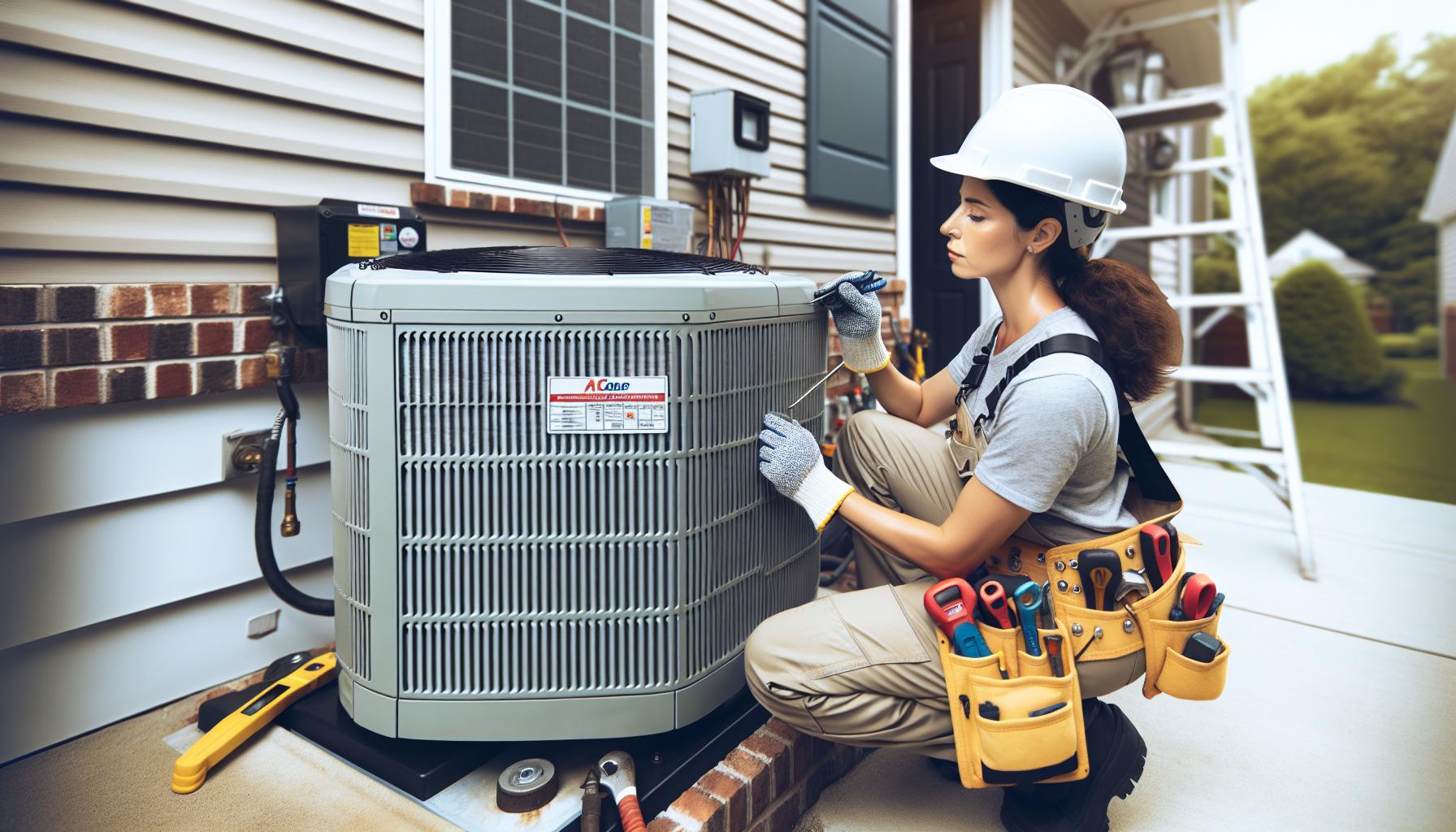Imagine beating the heat not with your conventional electric air conditioner but with a system powered by natural gas. It’s not just for heating or cooking anymore. Natural gas air conditioners are changing the game, providing efficient cooling while potentially lowering your energy bills. These systems work similarly to traditional air conditioners but with a twist: they use natural gas as their primary energy source. You’ll enjoy not only cooler air but also benefits like improved airflow, quieter operation, and eco-friendlier performance. Let’s investigate into how these innovative cooling units operate and why they might be the breath of fresh air your home needs.
Overview
When you’re considering the mechanisms of natural gas air conditioners, it’s essential to understand they fundamentally differ from conventional electric units. Natural gas air conditioners typically rely on absorption refrigeration or desiccant systems, both distinct from the standard vapor-compression cycle found in electric air conditioners.
Absorption refrigeration systems function by using natural gas as a heat source. The process starts with the generation of heat from burning natural gas, which then drives the absorption cooling cycle. A refrigerant, typically ammonia, absorbs the heat, causing it to evaporate. The now gaseous refrigerant circulates through the system, eventually cooling the air inside your home as it releases absorbed heat externally.
Desiccant systems, on the other hand, use a moisture-absorbing material. This technology capitalises on the desiccant s ability to naturally remove humidity from the air, which in turn reduces the temperature. A heat exchange process then regenerates the desiccant, allowing the cycle to continue effectively and efficiently.
- Advantages of Natural Gas Systems: – Eco-Friendly: They emit fewer greenhouse gases compared to coal-powered electricity plants. – Cost-Effective: Substantial savings in the long run due to lower operational costs. – Quieter Operation: Lack of compressors makes this system less noisy.
With unique operational characteristics, these units are not just a theoretical solution but a practical alternative too. For instance, the innovation from Be Power Tech demonstrates a hybrid approach combining fuel cells with air conditioning, tackling electricity consumption and greenhouse gas emissions.
Cost Comparisons:
Real-life cost analysis further highlights the benefits. Operating cost comparison charts show a clear advantage over standard electric units, making natural gas air conditioners a smart financial decision in residential settings.
By choosing natural gas air conditioning, you’re opting for a system that not only cools your home but does so in a more sustainable and potentially cost-saving way. The technology, while still emerging, shows a strong promise for a transformative impact on how we approach residential cooling.
How Does a Natural Gas Air Conditioner Work?

Understanding the Basics of Natural Gas Air Conditioning
Imagine your home staying cool and comfortable without relying extensively on electricity. That’s the reality with natural gas air conditioners. Unlike electric AC units, these systems operate on a natural gas-fired process. Essentially, they use gas instead of electricity as their primary energy source to provide cooling.
The most common type of natural gas cooling system employs an absorption refrigeration cycle. The principal components include a generator, a condenser, an evaporator, and an absorber. In contrast to electric air conditioners that use a compressor, the natural gas air conditioner relies on a thermally driven cycle. It involves heating the refrigerant to release and transfer heat, rather than compressing a refrigerant gas.
The Role of the Combustion Process
When you set your thermostat to cool, your natural gas air conditioner starts the combustion process. Unlike an electric AC, where electricity powers the compressor, in this system, natural gas is the star. Here’s a step-by-step breakdown:
- Thermal Energy Generation: Natural gas is burnt within the system to create thermal energy.
- Refrigerant Circulation: The generated heat increases the pressure of a refrigerant, usually ammonia or water, causing it to circulate through the system.
- Heat Transfer: As the refrigerant passes through the condenser, heat is expelled outside.
- Evaporation: The refrigerant then moves to the evaporator where it absorbs heat from the indoor air, effectively cooling it.
- Absorption: The low-pressure, cool refrigerant is absorbed and cycled back to the generator to begin the process again.
This continuous loop efficiently provides cooling without the need for a compressor, which can be a major source of energy consumption in electric AC systems. Besides, the ability to run at variable speeds allows the natural gas-powered engine to adjust and maintain optimal performance. As a result, it aligns precisely with your cooling requirements, without the wasteful on-off cycles of traditional air conditioners. The combustion process provides the unique advantage of being able to repurpose waste heat. For instance, during cooler months, the waste heat from the air conditioner can be utilized to warm the house. This dual functionality not only maximizes efficiency but also offers a sustainable approach to home climate control. By understanding the mechanics and advantages of natural gas air conditioning, you’re well-equipped to make an well-informed choice when considering cooling solutions for your home.
Benefits of Using a Natural Gas AC System

Energy Efficiency
When you’re considering an HVAC system for your home, energy efficiency plays a crucial role. Natural gas air conditioners stand out due to their use of an absorption refrigeration cycle, which can be significantly more efficient for cooling large spaces. With fewer mechanical parts involved, these units aren’t just reliable; they also consume less energy. Here’s how a natural gas AC system impacts efficiency:
- Greater airflow with less ductwork: Optimizes space and energy usage.
- Thermally driven capacity: Leverages a consistent source of heat for refrigeration, reducing reliance on high-energy components like compressors.
- Multi-zone cooling: Strategically delivers cool air only where needed, lowering overall energy consumption.
Cost Savings
Cost savings are a major advantage when you opt for a natural gas air conditioning system. Even though the initial purchase and installation can be higher compared to electric units, the operating costs with a natural gas system are often lower over time. Here’s a breakdown of how your savings manifest:
| Cost Element | Electric AC System | Natural Gas AC System |
|---|---|---|
| Initial Setup | Typically lower | Higher but offset over time |
| Maintenance Costs | May require frequent minor repairs | Less complex, fewer repairs |
| Operation Costs | Dependent on electricity prices | Benefits from discounted gas rates |
| Longevity | Varies | Upwards of 20 years longevity |
With many gas utility companies offering discounted summer rates and the systems’ inherent durability, your energy bills could decrease significantly with a natural gas AC.
Environmentally Friendly
Finally, choosing a natural gas air conditioning system is a step towards being more environmentally considerate. These systems produce less carbon dioxide compared to their electric counterparts, translating to a smaller carbon footprint. Your natural gas AC not only offers efficient cooling but also adheres to a more sustainable framework:
- Low greenhouse gas emissions: A responsible choice amidst increasing environmental concerns.
- Utilization of waste heat: The system’s waste heat can be repurposed, conserving energy and reducing the need for additional heating resources.
- Eco-friendly operation: Contributes to reduced environmental impact without compromising on comfort.
By selecting a natural gas air conditioner, you’re investing in technology that not only benefits you financially but also supports global eco-friendly initiatives.
Installation and Maintenance of Natural Gas Air Conditioners

Choosing the Right System for Your Home
When selecting a natural gas air conditioning system, your home s layout and your climate are paramount. Natural gas AC units excel in homes with open floor plans and are available in various sizes to match your space s cooling needs. Here are key factors to consider:
- Climate: If you’re in regions with mild temperatures, a compact unit may suffice. But for homes in places with extreme weather, a robust, zoned system ensures efficient cooling.
- Home Size and Design: Large homes with open spaces often require systems with higher airflow capacity, while smaller homes can be adequately cooled with less powerful units.
- Airflow Requirements: Enhanced airflow features make natural gas ACs ideal for multizone cooling which caters to different temperature needs in various rooms.
- Efficiency: High-efficiency models, sometimes boasting an equivalent SEER of 27, can slash cooling costs drastically, up to 75%.
Proper Installation Guidelines
The installation of a natural gas air conditioning system is critical to its performance and safety. Given that these systems may require less ductwork and are sensitive to proper calibration, it s essential to adhere to the following:
- Qualified Professional: Always engage a certified technician with experience in installing natural gas air conditioners.
- Safety Checks: Ensure gas connections are secure and leak-free.
- Correct Sizing: The unit must be sized accurately for your home to avoid inefficiency and excess wear.
- System Testing: After installation, the entire system must be tested for optimal operation and adjustments made as necessary.
Regular Maintenance to Ensure Optimal Performance
To keep your natural gas air conditioner running seamlessly, regular maintenance is pivotal. Benefits of consistent upkeep include prolonged system life, prevention of breakdowns, and sustained energy efficiency. Follow these maintenance tips:
- Annual Inspections: Schedule annual check-ups with a technician to inspect the system’s condition.
- Filter Replacements: Regularly replace or clean air filters to maintain high air quality and system efficiency.
- System Cleanliness: Keep the system clean, especially the components involved in air exchange and refrigerant circulation.
- Ventilation Check: Verify that all vents and ductwork remain unobstructed to ensure maximum airflow and system efficiency.
Adhering to these guidelines not only secures the longevity of your system but also guarantees a comfortable and cost-effective living environment. Without meticulous installation and maintenance, the full benefits of a natural gas air conditioner may not be realized.
Potential Drawbacks and Limitations

Limited Availability in Some Areas
Natural gas air conditioning systems are at the forefront of efficient climate control technology. But, their widespread adoption faces hurdles, primarily their limited availability. The infrastructure for natural gas is not uniformly distributed; hence these units may not be a viable option where gas delivery networks are absent. You’ll find that metropolitan areas have more access compared to rural or undeveloped regions.
Reliance on natural gas supply chains also means that during outages or pipeline issues, your air conditioning could be compromised. As a solution, you might need to explore hybrid systems that can switch between gas and electricity, though this could raise the complexity and cost of your setup.
Higher Initial Cost
Investing in a natural gas air conditioning system often entails a higher initial cost. This includes the purchase price, installation charges, and potential modifications to your existing infrastructure. The cost-effectiveness promised by energy savings is a long-term benefit, which may take several years to offset the upfront investment. Here’s a basic comparison between gas-powered and electric systems:
| Type | Initial Cost |
|---|---|
| Gas-Powered A/C | Higher due to added complexities |
| Electric A/C | Lower, simpler installation needs |
For those on a tight budget or unable to absorb such costs upfront, this factor alone can be a significant barrier to entry.
Safety Concerns and Proper Ventilation
Among the major concerns with gas-powered systems are the safety risks associated with natural gas. Proper ventilation is not just a recommendation; it’s a necessity. Ensuring that there are no leaks is pivotal, as natural gas leaks can lead to carbon monoxide poisoning or even explosions.
A robust monitoring system, including carbon monoxide detectors and regular inspections by certified technicians, can mitigate these risks but also adds to the maintenance cost and complexity. Expertise is required for installation and repairs, and there’s an inherent need for cautious handling of the systems to prevent potential hazards.
Remember, while these drawbacks exist, they are manageable with careful planning and consideration. It’s about balancing the short-term challenges against the long-term gains from efficiency, cost savings, and environmental impact.
Conclusion
Embracing a natural gas air conditioner means you’re opting for an efficient and eco-friendly way to cool your home. You’ve learned how to select the perfect unit and the significance of professional installation and upkeep. While there are hurdles such as initial costs and regional availability, the benefits like energy savings and reduced environmental impact are compelling. Remember, the right approach and maintenance can mitigate these challenges, securing the system’s benefits for years to come. It’s clear that when you weigh the pros and cons, natural gas air conditioning stands out as a smart choice for your comfort and your wallet.
